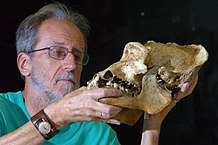 The eminent biological anthropologist Colin Groves died on November 30, 2017, at the age of 75, according to a press release from the Australian National University. The university described Groves as "one of the world's leading anthropologists and taxonomists who identified more than 50 species of animal during his career"; he specialized in the classification, variation, and evolution of living primates, the topic of his book Primate Taxonomy (2001). Along with Vratislav Mazák, he was the describer of Homo ergaster, sometimes regarded as a variety of Homo erectus.
The eminent biological anthropologist Colin Groves died on November 30, 2017, at the age of 75, according to a press release from the Australian National University. The university described Groves as "one of the world's leading anthropologists and taxonomists who identified more than 50 species of animal during his career"; he specialized in the classification, variation, and evolution of living primates, the topic of his book Primate Taxonomy (2001). Along with Vratislav Mazák, he was the describer of Homo ergaster, sometimes regarded as a variety of Homo erectus.
Groves was concerned about pseudoscientific belief in general, especially the danger posed to conservation by folk medical beliefs and "the baleful influence of creationism." In a 1996 article with the rococo title "From Ussher to Slusher, from Archbish to Gish: or, Not in a Million Years ...," originally published in Archaeology in Oceania, he excoriated young-earth creationism in no uncertain terms, concluding with a call to arms: "It is a great mistake to ignore the threat: it will not just go away, it must be countered. ... Scientists, but most especially archaeologists, are in the front line; we, not the artists or the politicians, are the ones with ammunition to stem the tide of creationist rubbish, and relegate it to Monty Python's Flying Circus where it belongs." His contributions to Reports of the NCSE included a 1999 article on Australopithecus garhi and a 2000 review of Patrick O'Connell's Science of Today and the Problems of Genesis.
Groves was born in London, England, on June 24, 1942. He received his B.Sc. from University College London in 1963 and his Ph.D. at the Royal Free Hospital School of Medicine in 1966. After a series of post-doctoral research and teaching appointments, he spent the remainder of his career at the Australian National University. He was a Fellow of the Australian Academy of the Humanities, and the honoree of a recent volume entitled Taxonomic Tapestries: The Threads of Evolutionary, Behavioural, and Conservation Research, edited by Alison M. Behie and Marc F. Oxenham (2015).
